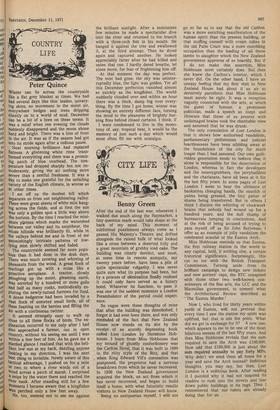Benny Green
After the end of the last war, whenever I walked due south along the Haymarket, a tiny question mark would take shape at the back of my mind. This moment of subliminal puzzlement always came as I passed His Majesty's Theatre and drifted alongside the ruined hulk of what looked like a cross between a deserted folly and a great mountain of grubby iced cake. The building was clearly derelict, and must, at some time in remote antiquity, say twenty years before, have been a pile of quite spectacular vulgarity. I was never quite sure what its purpose had been, but by a process of elimination finally realised it could only have served as •a luxury hotel. Whatever its function, to pass it was one of the saddest moments a London Perambulator of the period could experience.
So vague were these thoughts of mine that after the building was demolished, I forgot it had ever been there, and was only reminded of the fact that New Zealand House now stands on its site by the receipt of an acutely depressing book called Lost London by Hermione Hobhouse. I learn from Miss Hobhouse that my mound of ghostly confectionery was the Carlton Hotel, that it was built in 1899 in the ritzy style of the Ritz, and that when King Edward VII's coronation was postponed, the proprietor had a nervous breakdown from which he never recovered. In 1956 the New Zealand government acquired the block, an act from which it has never recovered, and began to build itself a home, with what futuristic results visitors to New Zealand House will know.
Being no antiquarian myself, I will not go so far as to say that the old Carlton was a more enriching manifestation of the human spirit than the present building, or that stuffing oneself with cream cakes in the old Palm Court was a more ennobling occupation than the leading of all those lambs to slaughter which the New Zealand government approves of so heartily. But if I do not make this assertion, Miss Hobhouse most certainly does. But then she knew the Canton's interior, which I never did. On the other hand, I have an uneasy feeling that my first visit to New Zealand House had about it an air so derisively parodistic that Miss Hobhouse must surely be right. It was a reception vaguely connected with the arts, at which the guest of honour, a prominent politician, made a speech so inept and illiterate that those of us present with undamaged brains took the charitable view and assumed that he was drunk.
The only consolation of Lost London is that it shows how authorised vandalism, parliamentary philistinism and judicial heartlessness have been nibbling away at the foundations of the city for much longer than I had assumed. Our own guiltridden generation tends to believe that it alone is responsible for the desecration of London, whereas in fact the developers and the moneygrubbers, the jerrybuilders and the charlatans, have all been at it for the last fifty years. In some pages of Lost London I seem to hear the sibilance of banknotes changing hands, the squelch of palms being greased, the tiny patter of shares being transferred. But in others I think I discern the whirring of clockworl. brains that nobody had wound up for a hundred years, and the dull thump of bureaucrats jumping to conclusions. And at the risk of being accused of trying to pass myself off as Sir John Betjeman, I offer as an example of jolly vandalism the celebrated scandal of the Euston Arch.
Miss Hobhouse reminds us that Euston, the first railway station in the world in any capital, held, if nothing else, a certain historical significance. Surprisingly, this cut no ice with the British Transport Commission. Turning aside from its brilliant campaign to deign new tickets and new porters' caps, the BTC conspired with those other two well-known connoisseurs of the fine arts, the LCC and the Macmillan government, to commit what the Architectural Review described as 'The Euston Murder.'
Now I, who lived for thirty years within yards of Euston, will not pretend that every time I saw the station my spirit was uplifted, but that is not the point. What did we get in exchange for it? A new one, which appears to me to be one of the most hilarious messes of the last fifty years. And then Miss Hobhouse reveals that the sum required to save the Arch was £180,000. How odd that £180,000 is just about the sum required annually to pay forty MPs. Why didn't we send them all home for a year and save the Arch instead? Seditious thoughts, you may say, but then, Lost London is a seditious book. After reading it I puzzled why it had not inspired its readers to rush into the streets and tear down public buildings in its rage. Then I remembered that our rulers are already doing that for us.










































 Previous page
Previous page